The Squid and the Whale
 for strong sexual content, graphic dialogue and language.
for strong sexual content, graphic dialogue and language.
Reviewed by: Richard F. Schmitz
CONTRIBUTOR
| Moral Rating: |
Very Offensive but with an overall good message |
| Moviemaking Quality: |
|
| Primary Audience: | Adults |
| Genre: | Comedy Drama |
| Length: | 1 hr. 28 min. |
| Year of Release: | 2005 |
| USA Release: |
October 2005 DVD: March 21, 2006 |
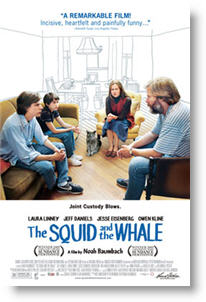

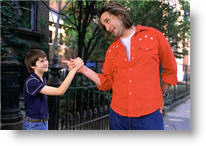
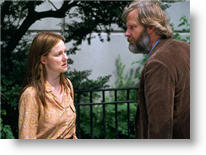

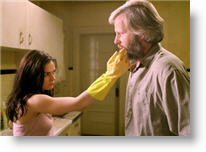
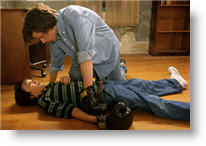
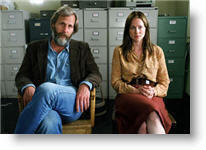



How can I deal with temptations? Answer
How can I tell if I’m getting addicted to pornography or sex? Answer
What is true love and how do you know when you have found it? Answer
Is formalized marriage becoming obsolete? Answer
How can I be and feel forgiven? Answer
Are there biblical examples of depression and how to deal with it? Answer
Under what conditions may Christians divorce and remarry? Answer
SPOUSE DIFFERENCES—What if I don’t like the way my spouse deals with the kids and I’d rather do it myself? Answer
Does God feel our pain? Answer
Got teens from the Millennial generation? Here’s some helpful parenting tips.
GOD—What can I do to make God real to my children on a daily basis? Answer
| Featuring |
|---|
| Jeff Daniels, William Baldwin, Laura Linney, Anna Paquin, Jesse Eisenberg |
| Director |
|
Noah Baumbach |
| Producer |
| Andrew Lauren, Reverge Anselmo, Miranda Bailey |
| Distributor |
“Joint Custody Blows”

Noah Baumbach’s film “The Squid and the Whale” contains very frank sexual situations involving teenagers and adults and more bad language than a rap concert, yet brings home a surprisingly moral message that will painfully resonate with any teen or adult who experienced their parents’ divorce.
“The Squid and the Whale” is set in an upper middle class somewhat bohemian neighborhood in Brooklyn in the 1980s. Jeff Daniels plays dad Bernard Berkman, a writer with one literary best-seller followed up by rejection slips and an unsatisfying career as an English professor. Joan Berkman, played by Laura Linney, is mom and enjoying increasing success as a magazine writer.
Jesse Eisenberg plays Walter, a 15-year old beginning to find his own way in life yet tied tightly to his family. Owen Kline plays younger brother Frank, perhaps 11 or 12. The performances of these young actors are remarkable, and are a credit to Baumbach’s skills as a director. The adults, particularly Daniels and Linney, are in top form as well.
The film opens at the nearby tennis club where Walter and Frank are taking lessons. Bernard, we see, is intensely interested in Walter’s keen desire to become a tennis pro. After the lesson, Bernard and Joan, joined by the youngsters, take opposite sides for a friendly game—which ends abruptly when Bernard’s hard shot slams into Joan. We see the tension between the two, while the boys are oblivious to the upcoming breakup of their parents.
This tragedy unfolds steadily and painfully. Before too long the happy brownstone home we’d been introduced two falls asunder. Walter and Bernard team up in Bernard’s new home, while Frank clings to Joan as his behavior at school slowly deteriorates.
Both boys face the tragedy of their parents divorce as they suffer emotional and spiritual pain. Walter, for example, has his first romance with Sophie, a girl he meets at school. Influenced by his dad, who urges him to “play the field” Walter treats Sophie poorly just as he begins to fall for Lili, one of Bernard’s students who moves into a spare room when she needs a place to stay.
There’s a remarkable scene where Walter, who realizes Lili isn’t interested in him and that he’s no competition for his dad, walks alone and passes a Chinese restaurant where Sophie is having dinner with her parents. The camera holds on him just for a second as he recognizes her. Earlier in the film, he’d been invited to dinner at the same restaurant as Sophie’s guest, but later rejected her thinking he could, at his father’s urging, do better. It was a scene that I think will resonate with many teens, and it shows the insight this film has for real lives.
Frank, meanwhile, is ignored by Joan who takes up with the tennis coach. In one scene, Frank is left alone for a weekend when each parent thinks the other is caring for him. This happens, we see, when Joan and her new boyfriend leave for a weekend ski trip while Bernard spends the time scheming to get alone with Lili. Frank, who has discovered pornography and alcohol has a lonely and self-destructive weekend which painfully unfolds for the viewers.
“The Squid and the Whale” does not shy away from the kind of issues teenage boys face when growing up. (see editor’s note below) There’s no gratuitous sex or language, merely an accurate portrayal of self-absorbed intellectual parents who cannot see the pain they cause to those they love the most.
I found this film amazing in its direct approach to portraying the damage divorce inflicts on children. For a Christian audience, a warning: this film is pretty much red state and urban Jewish middle class in its milieu, and might not be for everyone. The film does not end on a happy note (more of a neutral note), and the language is raw and the sexuality, even one the part of an 11-year-old, is very frank and disturbing. Still, this film is no teen sex trash, rather it carries a strong moral message and says a lot of the value of family. This is not a Christian film and does not have a Christian worldview. Still, it is universal in presenting the pain caused by divorce—and by doing so stresses the value of an intact family.
(Spoiler ahead) In case you were wondering, the film’s title stems from the famous lifesize diorama of a giant squid attacking a blue whale which hangs in the rotunda of the Museum of Natural History in New York.
ADDITIONAL WARNING FROM THE EDITOR:
Although the overall message of this film is positive, it is delivered in a crude and vulgar way (apparently for the sake of realism). The story is based on the childhood experiences of its director Noah Baumbach. One of our other contributing reviewers has also screened “The Squid and the Whale”. He confirms that although the basic MEANING of the film is “a highly orthodox message about the destructive influence of divorce in our culture”, “some will find the CONTENT of the film (the way it communicates that message) highly objectionable. There is a lot of sexual content, and while it is not portrayed erotically, it is portrayed graphically and crudely, and I think some conservative viewers may not be able to get past the visceral shock of seeing an adolescent masturbate on screen and then smearing his semen over the school’s library books to even think about what meaning that scene (or others) is trying to make.”
Keep in mind that this film is R-rated. There are numerous f-words and other expletives. In addition to the scene mentioned above, two other sexually explicit scenes worthy of concern are: (1) a teen stimulating her boyfriend manually; (2) a teacher/father and a female student preparing to have sex in his home (both still mostly clothed) are interrupted when the elder son walks in on them while they are petting, and the father is trying to talk her into giving him oral sex.
See list of Relevant Issues—questions-and-answers.


Both parents and children are victimized by divorce, and it is not easy growing up as a teen in that type of situation. From my perspective, although the movie is vulgar in many aspects, it is probably one of the truest depictions of teenage life I have ever seen. I recommend it to parents who are willing to get past the explicit scenes in order to better understand the struggles and pressures of modern teenage life, even teens, like I was, that are surrounded by a Christian environment.
Offensive / 4
I was disappointed that the story had very few levels to it, although there were several themes running alongsidely because there were, after all, so many characters struggling with their lives. The sexual elements are very disturbing and marred the movie considerably for me. I am giving my overall reaction as “neutral,” because it was nevertheless an original independent film that tried to be a little different. But it could have dealt with the subject of divorce better, even if not from a Christian point of view.
Very Offensive / 4
I don’t believe this is a film that Christians will enjoy seeing. I am not a prude, but I certainly have my limits as to what goes beyond “good taste” in a movie. I like to learn and see realism, but the sexual content in this movie was much more than I could stand. It left a very bad taste in my mouth and I would not recommend it for anyone, especially under 18.
Very Offensive / 4



The cast is superb while the movie is poignant, even overpowering at times. However, this film isn’t for everyone. It’s brutally honest and yet very disturbing. I found Noah Baumbach’s film to be extremely relevant. Yet young children should not come within a city block of this film.
After witnessing “The Squid and the Whale” in its entirety, I came away from this movie with a deeper appreciation as to why God hates divorce (Mal. 2:16). Divorce ultimately scars for life and often destroys the ones were supposed to love and care for. Over the years people have reinvented the meaning of love to fit their needs. Therefore the true essence of love has been lost in translation to the general masses.See all »
My Ratings: Very Offensive / 4